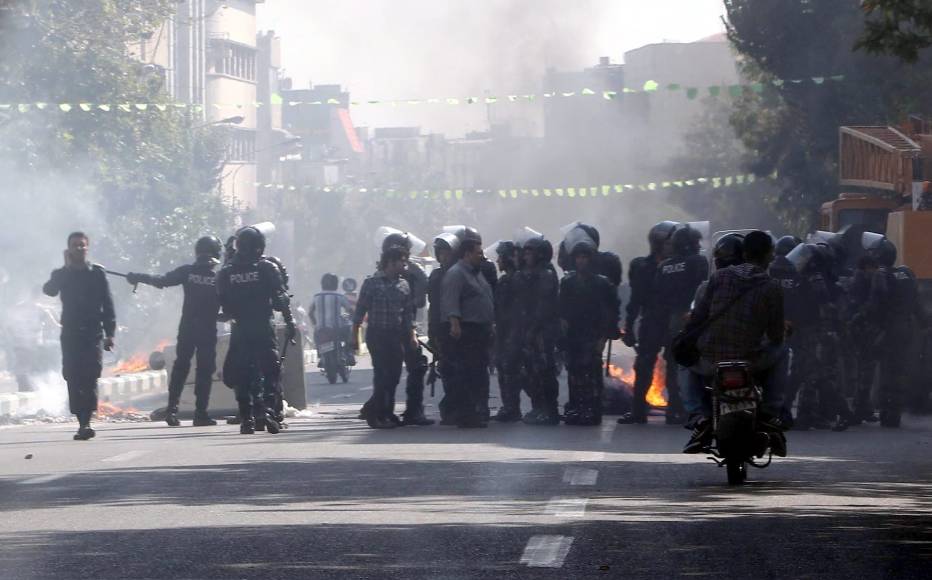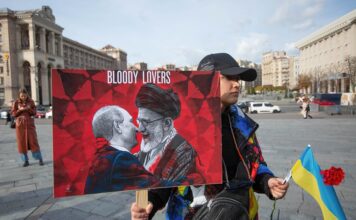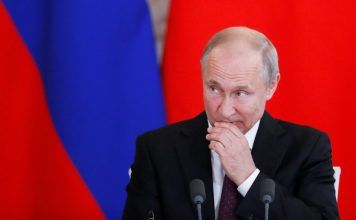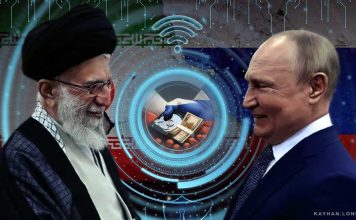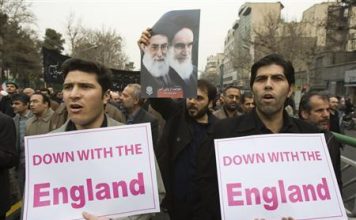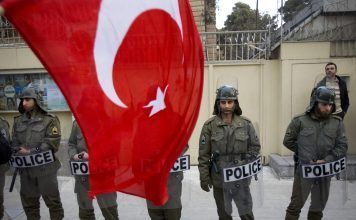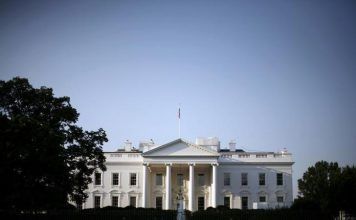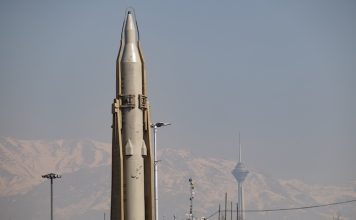By Kayhan Life Staff
Special units of the Islamic Revolutionary Guards Corps (IRGC,) Basij (plainclothes volunteer militias,) riot police, and security and intelligence forces have brutally cracked down on the ongoing nationwide protests sparked by the death of Mahsa (Zhina) Amini, a 22-year-old woman who died while in the custody of the morality police on Sept. 16 in Tehran.
According to human rights organizations, units of Iranian special forces have killed 348 people, including 43 children; injured scores of others; and arrested nearly 16,000 people since the start of the protests two and a half months ago.
Kayhan Life recently spoke to Reza Kazemzadeh, a psychologist based in Belgium, on violence within the special units of Iran’s law enforcement and security forces tasked with brutalizing protesters. Kazemzadeh has extensively researched the psychology of violence and its manifestation in Iranian culture.
[aesop_image img=”https://kayhanlife.com/wp-content/uploads/2022/11/kazemzadeh.jpg” panorama=”off” align=”center” lightbox=”off” captionsrc=”custom” caption=”Reza Kazemzadeh” captionposition=”left” revealfx=”off” overlay_revealfx=”off”]
Do you think the current pro-democracy movement in Iran can create a rift within the security forces and weaken them?
We are in a crisis. One of the principal characteristics of any crisis is the unpredictability of its outcome. Previous rules cannot govern current and future events. Many events in the coming days, weeks, and months inside and outside Iran could significantly impact the current situation.
The death of Mahsa Amini sparked a nationwide protest. Also, the massive protest in Berlin [on Oct. 22] significantly impacted the developing situation in Iran.
There is much potential among those who identify with young boys and girls in Iran. However, they have not joined the movement yet and are not ready to pay the price.
It is vital to create a climate for turning this resolve into action. It could then play a crucial role in generating a rift [in security forces] which will help the movement continue.
The forces that crush [pro-democracy] movements are trained for short-term objectives. It costs a lot of money to maintain them and keeping them motivated is challenging.
Perseverance and continued uprising are the Achilles’ heel of the security forces. They cannot engage in protracted operations to repress protests.
Even those who started the current uprising did not foresee the elements that have helped it to continue, including parallel yet independent movements and the absence of a central leadership.
The uprising has entered a crucial phase, marking a new beginning in the movement. The current movement is part of a new paradigm signified by a shift in public opinion toward demanding a complete overhaul of the governing system.
The desire to overthrow the regime and not reform it marks the movement’s new phase. The public is not seeking ways to reform the regime, but has rejected it completely. Also, people do not desire to enter a dialogue with the state.
I do not think the current events, which have surprised everyone, will move forward if we fail to analyze and understand them properly. For instance, we must understand every aspect and wider social and political implications of the emblematic slogan ‘women, life, freedom,’ which has become a global aspiration.
Now that our society has entered this new phase, we must bring the fight to a desirable conclusion through good planning. We must ponder the events carefully.
Our prominent thinkers have so far focused on the political aspect of the events. However, the current uprising is a multifaceted development.
The movement is focused on short-term goals, insisting on realizing a particular idea. However, some of these issues are not thought through sufficiently. The views of those involved will not bring the movement to fruition if they fail to consider current social realities.
What is the source of the sheer brutality shown by the Islamic Republic’s oppressive forces against the Iranian people? Does it have an underlying psychological cause?
At the end of World War II, the U.S. conducted thorough psychological evaluations of all captured senior Nazi officials before putting them on trial [at the International Military Tribunal] in Nuremberg [from Nov. 20, 1945 to Oct. 1, 1946.]
They concluded that none of the defendants suffered from neurosis or mental health problems.
Adolf Eichmann (executed in Israel in June 1962) described the mass killings in Nazi extermination camps as part of his duty. Is there a correlation between being part of a group of oppressors and the level of violence and cruelty?
The sense of belonging to a group or an organization plays a crucial role in the operation of security forces. Members must resolve ethical issues not outside but within the group.
We see examples of this behavior in military ceremonies, including morning rituals and marches to strengthen the sense of belonging to a group.
The centers that train security forces aim to create unusual creatures who, as members of a group and under extraordinary circumstances, meaning during an operation, easily violate laws governing the lives of ordinary people.
When human beings submit to greater power than their selves, the group’s ideology enables them to act outside laws that govern ordinary people’s lives with great impunity.
The belief that their actions determine the country’s safety, security, and fate motivates the oppressive forces. As a result, not only do they not think they are committing any crime when brutalizing protesters, they believe they are being selfless in their actions.
They feel empowered by the freedom of being above the law, act with impunity, have a sense of belonging to a privileged group, and behave outside the norms.
Their actions reaffirm their sense of belonging to a group which gradually morphs into believing that they are an intrinsic part of the system’s core values, like the Basij who have merged with Velayat-e Faqih [supreme jurisconsult, namely Iran’s Supreme Leader Ayatollah Ali Khamenei.]
The deliberate operational measure aims to eliminate contact between the group members and their victims. During an operation, members stay with their units all the time.
They have little or no contact with the outside world, including their families. During these extraordinary situations, the group only participates in pre-scheduled events, reinforcing their enthusiasm and commitment.
Group members must prove to their commanders their willingness to risk their lives. They are told that it is justified to use violence in the line of duty to safeguard the country’s security, and therefore, they can operate with impunity outside laws governing ordinary people.
The red line for the state is that it would not punish members of a special unit for silencing public outcry. Possible condemnation of a group could create doubt among security forces and damage the state’s credibility, ultimately harming the security apparatus. Under such circumstances, the regime cannot expect members of its security units to fulfill their ‘duties.’
Is it still possible to condition humans to be uncompassionate and indifferent to society, given the prevalence of news outlets and social media? What segment of society do these people usually come from?
Most of them could not climb out of their social class despite their capabilities. Such setbacks stem from their families’ social and economic limitations.
For instance, most Nazis were the second and third generations of Germans who migrated from rural and small towns to big cities, which could also be true for the Islamic Republic’s special security units.
Being certain that they are immune to prosecution for their crimes cannot be the only motive for their actions, given their aspirations. Their role in cracking down [on protesters] overcompensates their feeling of inferiority, making them feel powerful and superior to society.
However, they cannot become financially as powerful as their superiors; otherwise, they will not follow orders or be useful for such operations any longer.
Power and hatred are crucial elements of such a system. A combination of these factors underlines the system’s ability to control a group trained to commit acts of violence.
Urban warfare aims not to assault people as a show of force, but to use measured violence and sometimes sheer brutality to control and dissuade protesters and oppress society.
Violence is a double-edged sword that cuts both ways and could threaten the system’s existence if it escapes control. A despotic system aims to rationalize violent measures by the government. Therefore, a culture of obedience is of utmost importance in such situations.
However, power and hatred are insufficient, so the security forces are trained to dehumanize protesters during their operations. They are trained to view rioters as devoid of humanity, so they can easily humiliate and brutalize them. As part of their training, they are taught not to feel compassion for others.
Part of any totalitarian ideology is dehumanizing its opponent, which does not mean an oppressor cannot be a good father or help his neighbors. They could have all those qualities outwardly. However, they become an agent of oppression through training. They are conditioned to be misanthropes.
What prompts some of these elements to commit sexual violence against protesters?
Repressed sexual urges could manifest as a destructive power. A comprehensive study of Islamic movements, funded by a French organization and conducted in Morocco, has shown a direct correlation between repressed sexual energy and Islamic extremism. The greater the repression of sexual urges in an Islamic country, the more likely people gravitate to religious fanaticism.
In his book “The Mass Psychology of Fascism” (1946), the Austrian physician and psychoanalyst Wilhelm Reich (1897-1957) argued that fascistic movements were directly related to the repression of sexual urges. However, Reich was not a sociologist and relied on information he collected from his patients.
Do you mean that repressing sexual urges could cause a person to harm others or may lead to religious bigotry?
The human psyche reacts in different ways to the repression of sexual urges and energy. For instance, a person might mischaracterize a negative thought as a brilliant concept by misrepresenting their sexual frustration as a conscious choice to abstain from the sex act, which they describe as a vile perversion.
They convince themselves that their strong ethics prevent them from having sex. They call it ‘asceticism,’ an attitude we saw in those who engineered a revolution against [Mohammad Reza] Shah [Pahlavi in 1979.] I call it the ‘bitter taste of happiness,’ which was common among the religious and secular revolutionaries then.
However, sexual urges do not dissipate but build up and manifest themselves as destructive and inhumane behavior.
What is the source of this ‘asceticism’? During the Shah’s reign, the Iranian people got the first chance to move up the social ladder.
People do not suffer massive disappointments in societies with no chance of upward social mobility. The underprivileged class is not frustrated because they accept their conditions as a universal law. For instance, a cobbler’s son will follow in his father’s footsteps in such a society. Also, people born in affluent families remain within their social class.
However, hopes, desires, and dreams become part of life in a society where social mobility becomes a reality. So, the desire to ‘possess’ a girl from a higher social class could become an objective.

